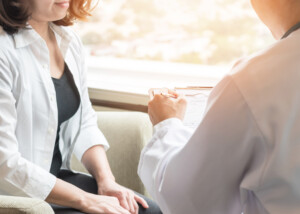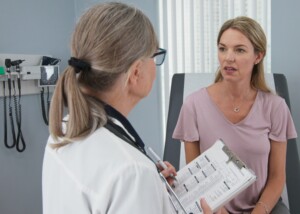First make sure your “hemorrhoid” isn’t really anal cancer.
If you’ve been newly diagnosed with anal cancer, here are detailed guidelines on how to survive this disease.
In 2017 I was a single professional living in New York City. I had a largely carefree life with great friends, international travel and enriching cultural experiences.
But there are sometimes moments that surprise you, shake you and change the trajectory of your life. I had one of those moments and it ignited a fire within.
At first, I thought I had a hemorrhoid, but it stuck around for too long. I felt itching and then there was bleeding.
While there was not a lot of blood, it was daily and consistent. I made an appointment with my longtime gynecologist.
My vaginal human papillomavirus (HPV) test was negative. She gave me a digital rectal exam and said I was fine. My gut, that inner voice I trusted, told me I was not fine.
The very next day I sought a second opinion from my trusted gastroenterologist.
He looked with the anoscope and then conducted a sigmoidoscopy. He palpated the area with his fingertips and felt a hardening which should not have been there.
Ten days later, the biopsy results confirmed I had stage 2 anal cancer.
It’s important to emphasize that I was luckier than most people. My cancer was found relatively early.
I have come to learn that so many anal cancer survivors are told they have a hemorrhoid even after they went for a second opinion (or a third or a fourth).
Anal cancer, like some other HPV-related cancers, is often misdiagnosed or not diagnosed until the cancer is advanced — and positive patient outcomes are less certain.
Many anal cancer patients also didn’t know they had high-risk HPV, the form of HPV that can cause six different types of cancer: cervical, oropharyngeal, anal, penile, vulvar, and vaginal.
Personally, I did know I had HPV. I was born before there was a vaccine, and I had tested positive through a Pap smear co-test many years earlier.
What I did not know is that there are many strains of HPV, and high-risk HPV strains do not cause genital warts or any other symptoms.
They are virtually invisible until they begin to evolve. I also did not know 80% of sexually active people will contract HPV during their lifetimes — and that it won’t fully clear [out of their system] in some of those individuals.
Instead, it goes dormant, and can come back decades later and progress to cancer.
If you’ve had a high-risk strain of HPV in the past, be extra careful about noticing any strange symptoms in the parts of the body associated with the six HPV cancers: cervical, vulvar, vaginal, head and neck, penile and anal.
I was fortunate to live near a great cancer center. My radiation oncologist had extensive experience treating and researching anal cancer.
It’s important to have a radiation oncologist who knows how to provide the most up-to-date targeted radiation that will spare surrounding tissue and minimize long-term side effects from the radiation.
Even though the treatment was extremely painful, I recovered quickly. I emerged from treatment with a renewed zest for life, but I had two lingering concerns.
The first was that while my anal cancer was gone, the HPV infection was not. I worried that it could cause another bout with cancer.
The second was that my white blood cell count was low and, one year after treatment, remained so.
A low white blood cell count was indicative that my immune system was not functioning optimally—this was potentially problematic not just for my HPV infection but for other illnesses and disease as well.
My gynecologist recommended I take a supplement called AHCC® that is derived from the roots of shiitake mushrooms.
While AHCC® was unknown to me at the time, it is one of the most studied immune supplements in the world and has been used in thousands of clinics globally for decades.
In fact, a National Institutes of Health (NIH) funded clinical trial showed evidence that AHCC® can clear the HPV virus.
My own results were amazing. Within three months of taking AHCC®, my blood counts improved, and I felt like I could stop looking over my shoulder at the specter of HPV.
To celebrate my new lease on life, I threw a big party for all the doctors, nurses and everyone who helped me.
I had toilet paper centerpieces, ate a buttocks-shaped cake, smacked a bum pinata around and gave away Preparation H in the gift bags. I count that celebration as one of the best moments of my life.
Five years after my fight with an HPV-associated cancer, I have no evidence of disease (NED) and I’m thriving.
AHCC® continues to be a part of my daily routine to keep my immune system strong.
So is regular exercise, eating nutritious food, sleeping well, reducing stress, maintaining a positive attitude and enjoying an active social life.
The upside of my cancer diagnosis has been more than a healthier lifestyle and greater appreciation for life. I discovered a new career and my life’s purpose.
HPV Cancers Alliance
In 2019, I founded the HPV Cancers Alliance alongside my friend and fellow survivor, actress Marcia Cross.
Together, we raise awareness about HPV and the cancers it causes.
HPV Cancers Alliance holds educational webinars, shares resources, provides patient support, and runs information campaigns designed to destigmatize HPV, promote prevention and screening, and educate the public.
I am completely dedicated to bringing wellbeing to others and delivering a vision of the world without the suffering HPV can bring.
If you’d like to learn more about HPV, HPV Cancers, the HPV Cancers Alliance and how you can help, please visit hpvalliance.org.
 After she kicked cancer out of her body, Lillian Kreppel didn’t go back to her successful career in sales. Instead, she made a radical shift and started HPV Cancers Alliance to raise awareness about HPV and the cancers it can cause.
After she kicked cancer out of her body, Lillian Kreppel didn’t go back to her successful career in sales. Instead, she made a radical shift and started HPV Cancers Alliance to raise awareness about HPV and the cancers it can cause.
.










































